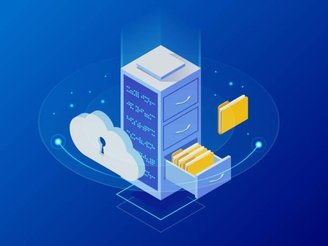The advancement of technology requires companies to make new decisions every day. One of them is the choice between two data storage and processing models: opt for cloud computing and local servers?
Both have their own characteristics, from implementation costs to flexibility of use, and can meet different business needs.
For example, local servers are still The choice of companies that want to have more control over their IT infrastructureCloud computing attracts the attention of those who value scalability and practicality.
But ultimately, which option offers the most benefits for your business? Check out the article and learn the main differences between local and cloud servers, the advantages and disadvantages of each alternative!
What is the difference between local server and cloud?
The main difference between a local server and the cloud is where data and programs are stored and managed.
Hire a company The cloud is like renting a car with maintenance included; A local server is like buying the car and having to take care of all the maintenance. We will explain this better below:
Local Server
On the local server, the company has a physical computer, usually located at its headquarters, that stores all data and programs used internally. The company’s IT team is responsible for performing maintenance, performing backups, and ensuring security.
Advantages:
- Complete control of the data because everything is in-house;
- Greater customization as the server can be configured to the specific needs of the company.
Disadvantages:
- High initial costs to purchase the equipment;
- Requires ongoing maintenance, which can be costly for IT technicians and security equipment;
- In the event of a problem such as a power outage, access to data may be compromised.
Cloudy
The cloud, on the other hand, is an online server provided by specialized companies such as Google, Amazon or Microsoft. Instead of keeping a physical server within the company, data and programs are stored in external data centers – Accessible from anywhere with an internet connection.
For example, an online store that chooses to store its database in the cloud allows its employees to access sales information and reports wherever they are.

Advantages:
- Accessible from anywhere, facilitating remote and hybrid working;
- Flexibility means it’s easy to increase or decrease storage space as needs change;
- There is less need for local maintenance as the vendor company takes care of security and updates.
Disadvantages:
- Internet addiction. If the connection is lost, access to data is lost;
- Recurring cost as companies pay for monthly or annual use of the service.
Cloud Computing etc. local server: find out which is most advantageous
Knowing the difference between local server and cloud helps companies choose the infrastructure that best suits their needs, security, and budget. Check out 10 criteria that can help you in this process:

1) Maintenance
Cloud maintenance is the responsibility of the vendor; saving the company the cost and time spent on upgrades and repairs. This is ideal for companies that prefer to avoid wear and tear on equipment that loses value over time.
An on-premises server, on the other hand, usually needs regular maintenance by the company’s IT team. Hardware equipment loses value faster. This becomes a disadvantage if the server needs to be upgraded frequently to keep up with technological advances.
2) Access
When there is a demand for access to data and applications from anywhere with an internet connection, the cloud is more advantageous in terms of access. The needs of teams working remotely in real-time collaboration are met in this context.
As for the local server, access is usually limited to the internal network, meaning it can only be accessed from the location where it is installed.
3) Scalability
In the cloud, it is very easy to increase or decrease storage or processing: just adjust the plan with the supplier; It will be ready for use in a short time.
To expand the local server, it is necessary to purchase new equipment, which takes time and involves high costs. Think of the local server like a DVD: If you want more movies, you have to buy more DVDs!
4) Reliability
Cloud provides high reliability with globally dispersed data centers Make sure data is always available. Most providers offer uptime of 99.9% or more.
The cloud is like a bank with multiple branches; Even if one is temporarily down, you can still access your data on the other. The local server may also be reliable, but local problems (such as power outages) may interrupt access.
5) Data backup
Cloud providers offer automatic backups and, in many cases, backup backups in different geographic locations.

If you choose a local server, remember that backup is the company’s responsibility. Therefore, maintaining a backup routine will require planning and resources.
6) Security
Cloud providers are investing heavily State-of-the-art security including encryption and continuous auditsbut it requires a secure connection and good security practices on the company’s part.
A local server allows more control over security, but is also dependent on the organization’s own security resources and practices.
7) Performance
The cloud can offer high performance, especially if a company chooses plans that include additional processing power. However, dependence on the internet may affect speed.
The local server delivers superior performance for applications that require fast and continuous processing, without relying on an external connection.
In this sense, you can think of cloud computing as using a well-equipped shared kitchen that everyone needs access to. Local hosting is like having your own well-equipped kitchen next door, ready to use.
8) Investment
cloud computing Requires a monthly or annual investment depending on usageThis makes the cost more predictable and affordable, especially for companies that prefer to avoid high initial investments.
A local server requires a high initial investment to purchase hardware and software, as well as recurring maintenance and support costs.
9) Support
Cloud support is usually offered by the service provider with dedicated support 24/7. This advantage is interesting for companies that do not have a robust IT team.
Note that issues may take longer to resolve because the local server depends on the company’s internal support or hiring external technicians.
10) Compatibility
Cloud providers typically follow strict compliance standards and certifications such as ISO and GDPR, but the company must verify that data is stored and processed in accordance with local laws.
cloud like this Outsourcing a service that already meets various market regulationsHowever, it is important to check the details of the contract.
A local server allows full control over data storage and management, making it a good choice for companies that need to comply with certain regulations regarding the location of data.
In short, if your company needs full control and you don’t care about the initial cost of a local server, this could be the right choice.
Already cloud is ideal for companies Look for flexibility with remote access and scalability, but those who are willing to pay for convenience.
Did you like the content? Stay informed about TecMundo. Take a look at the future opportunities and challenges with Edge Computing and Machine Learning here. Until next time!
Source: Tec Mundo
I am a passionate and hardworking journalist with an eye for detail. I specialize in the field of news reporting, and have been writing for Gadget Onus, a renowned online news site, since 2019. As the author of their Hot News section, I’m proud to be at the forefront of today’s headlines and current affairs.










